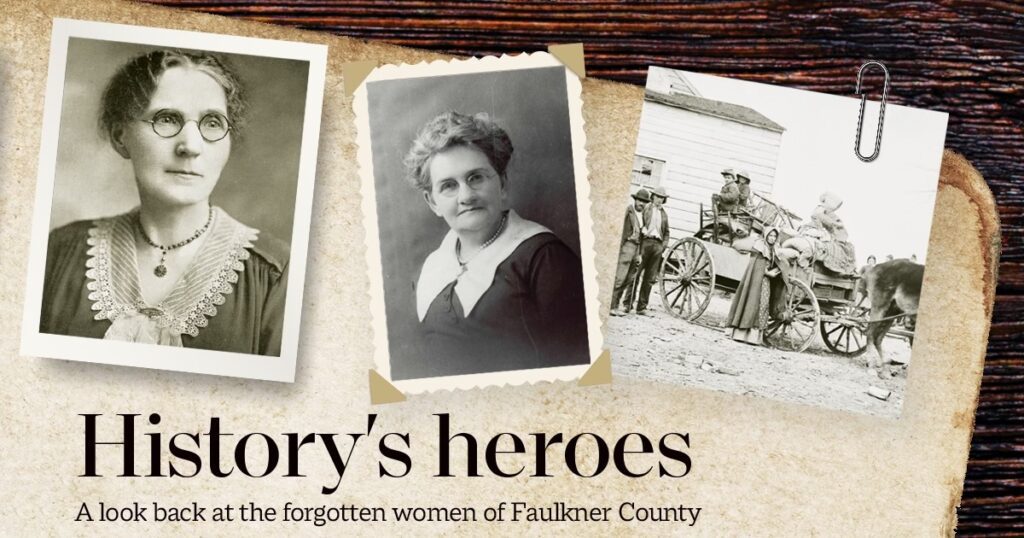30 Apr 2024 A look back at the forgotten women of the 501
By Vivian Lawson Hogue
I don’t know why, but nearly everything that functions as a mode of transportation, such as a boat, cruise ship, airplane, tank or beat-up pickup truck, is of the female gender. The same is true of old houses, vehicles, our country, guns and American flags, as in “long may she wave.” I thought it might be an unflattering reference to the age or personality of older women. Then, I realized that it was homage to something that is dependable, stalwart and something that makes someone content!

Let me explain this for you through Faulkner County history. The details of early women’s lives seemed hidden by the focus upon the stout-hearted men who wanted to own and develop land. In the second rank were their children, often many per family, who were involuntary farm hands and household help. But the ones who helped things happen were frequently mentioned simply as “his wife.” Rarely are the women mentioned as necessary, and in some cases, the wives’ names were lost in time! Here are some stories that give them deserved credit.
Elijah Bivens arrived here from Tennessee. Family members remember his wife’s last name but not the first although she bore her husband 11 children. They all arrived here in a wagon train with other families, bringing their cattle with them so the children could have milk. Elijah settled his family near Vilonia and raised cotton, and we must assume his wife and children picked it. Shortly thereafter, Elijah’s wife died and he moved to the hills, married a second time and increased the number of his children to 20. That’s a lot of help.
William Samuel Cooper was born in Kentucky in 1832. When the Civil War began, William joined the Confederates, while his brother joined the Union forces. During his tour of duty, he met Martha Utley, a well-educated Tennessean, and they married in 1866. Due to post-war tensions, the Cooper family and four other families began a move to Oregon in oxen-drawn wagons, with Martha and daughter Molly taking turns riding a horse. In 1871, they reached Mill Creek near Greenbrier.
Children soon began dying of whooping cough, so the families decided to settle there. There was some belief then that there were certain people who could cure babies of childhood diseases, and it seems local residents felt that Martha was one of them. They said she could blow in their mouths and repeat certain words and the child would be cured. Martha was also a help for many adults as well, as she had the knowledge of letter-writing and legal matters.
John Elisha Little arrived in Arkansas from Attala County, Miss., in 1885 and shortly thereafter married Lollie Trundle. He purchased land in Faulkner County, eventually establishing a plantation of 3,200 acres along the Arkansas River and west of Mayflower. A daughter was born in 1891; his wife died in 1892. The area around his plantation came to be named Lollie in recognition of his wife. Following Lollie’s death, Little married Sammie Glenn. Their impressive mansion at 427 Western Ave. was built after their first home burned. Little died in 1928.
George Washington Donaghey hailed from Louisiana. One would have to read the book “Carpenter from Conway” to know the complex talents and interests of this humble man. One of his best moments was a chance meeting with his future bride, Louvenia Wallace, at a local Christmas party. Following their marriage, Louvenia would later support him in his quest for the highest office in the state and join with him in donating $2,000,000 to what is now known as University of Arkansas Little Rock. After he became governor, he said, “There is just one reason I’m not going to enjoy being governor. I don’t want to leave our home in Conway. I love the tree-shaded streets and the magnificent oaks.” I know Louvenia was elated that he named a street for her! You probably pass it every day when you travel Donaghey Avenue.
These examples of what women before us could and did do are not recognized by recent generations. Most early Arkansas women did exhausting work, whether it was housework, farm work or having and raising children. Without the knowledge of bacteria, sanitation, or blood clots from remaining in bed too long post- childbirth, many women and babies died. In those instances, men had to find another wife quickly as they could not care for children and do farm work. Women did likewise in the event of their husbands’ deaths, as they had no way to purchase provisions.
There are a number of women today who work farms or businesses alongside family members to provide needs for living. Through past centuries and now, I think we could call them the Wonder Women of Proverbs 31:10-31!
- They found their ‘true grit’ - January 5, 2026
- And that’s what Christmas is really all about - December 2, 2025
- Giving thanks - November 4, 2025









